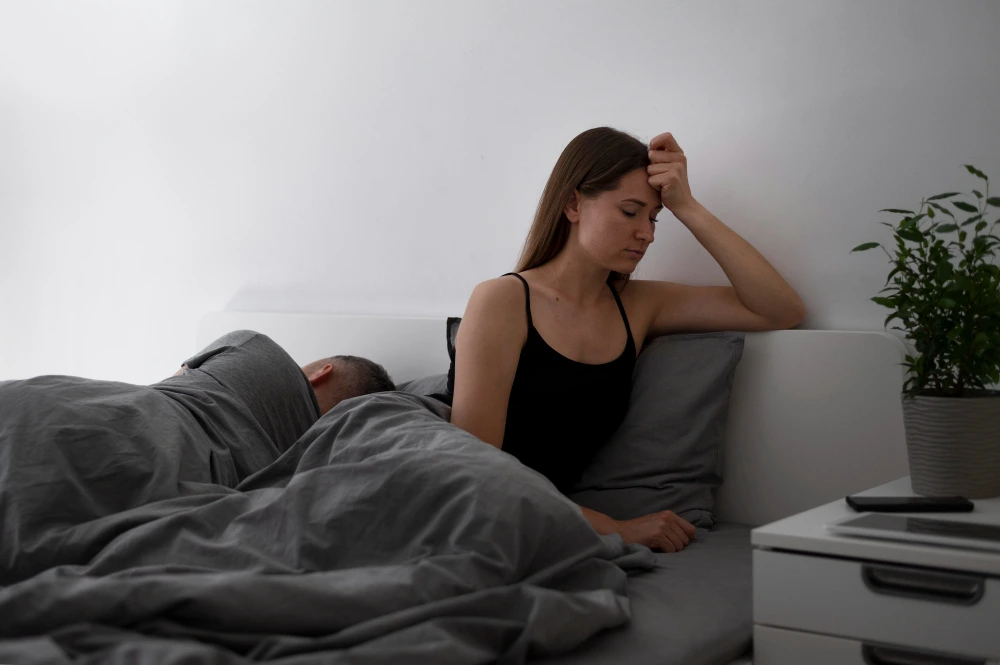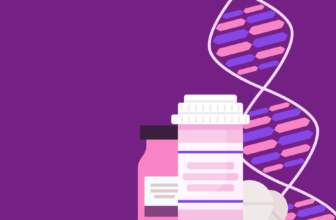
[adinserter block=”3″]
If you’ve ever struggled with insomnia, you know how it can impact your daily life. Sleep is an important factor for neuroplasticity, and chronic sleeplessness can have severe consequences. Fortunately, various techniques and lifestyle changes can improve the quality of your sleep. In this article, we’ll explore a 12-minute approach to help you combat insomnia effectively.
How To Cure Insomnia In 12 Minutes?
Are you looking for “how to fix insomnia?”. Here are a few tips and methods that aid in curing insomnia:
1. Morning Light Exposure
Start your day with five minutes of natural sunlight. This exposure helps synchronize your circadian rhythm and tells your body it’s time to be awake. Go outside and soak in the morning sunlight.
Though the cure of insomnia is quite difficult, you can look at these tips for getting the perfect sleep in 12 minutes.
Also Read: Which Is The Best Sleeping Position?
2. Limit Blue and White Light at Night
A study says overexposure to blue and white light, frequently emitted by electronic devices such as computers and smartphones, can disrupt your sleep. To counter this, you can activate a blue light filter on these devices. If you find it necessary to use electronic devices within two hours of bedtime, it’s a good idea to decrease the screen brightness to the lowest level and maximize the blue light filter. This can help minimize the impact of excessive light exposure on your sleep quality.
3. Read Your Way to Sleep
Sleep is quite important. Therefore, reading can be an effective way to fall asleep, but the key is to read something that is not too engaging. Opt for something uninteresting to help you drift off into slumber.
4. Light in the Morning, Dark in the Evening
Exposure to sunlight is a key factor that impacts your sleep-wake cycle. Light exposure plays a crucial role in regulating your circadian rhythm, which is your body’s internal clock responsible for controlling your sleep patterns.
5. Listen to an Uninteresting eBook
Choose an eBook or an audiobook on a subject that doesn’t interest you. The monotonous content can make you tired and improve your ability to fall asleep.
Also Read: Is 6 Hours of Sleep Enough?
6. Use Your Imagination
Engaging your imagination in a repetitive and calming manner can help as well.
Imagine Your Happy Place
Imagine being in your most peaceful spot. Think about every little detail. Feel the soft sand under your feet or watch the waves at the beach. Creating these calm images in your mind can take you to a make-believe world and help you fall asleep.
Also Read: 7 Natural Ways to Sleep Better for Healthy Lifestyle
7. Yoga and Meditation
If you find your mind racing with too many thoughts and worries, it can be difficult to fall asleep. Meditating or praying can be helpful in letting go of these concerns and finding a sense of calm.
Meditation and yoga are useful for stopping overthinking, a habit known as rumination. By redirecting your attention to calming activities, you can overcome your worries and anxiety.
Also Read: Sleep Problems: How to Improve Without Medication in 8 Easy Ways
8. Prayer
If you have faith in a higher power, prayer can be a powerful way to release your worries and fears. Surrendering control and placing your concerns in the hands of a higher power can offer solace and peace.
9. Cure a Stuffy Nose
Nasal congestion can affect your ability to sleep. Dry air during the winter months can worsen stuffy noses.
10. Exercise for Better Sleep
Physical activity or regular exercise can help you in improving your sleep cycle. Engaging in exercise, even for a short duration, has a positive effect on your sleep patterns. Here’s how you can incorporate exercise into your routine:
- High-intensity interval Training (HIIT)
It is a form of exercise where you perform high-intensity, high-energy aerobic activities in short bursts. The good news is that you don’t need to break a sweat or allocate much time for HIIT. Try six sessions of 2-minute high-intensity exercises throughout the day, such as jumping jacks, push-ups, or jumping rope. HIIT can boost your metabolism.
If HIIT isn’t your preferred exercise, take a fast walk or jog for 12 minutes.
11. Try Electrolytes
Maintaining proper hydration is essential for quality sleep. Dehydration can lead to restlessness. You can use electrolytes to promote relaxation and hydration:
Consider taking mineral or electrolyte supplements to help your body relax and combat dehydration. You can purchase these supplements either in health food stores or online. It’s important to be cautious with the dosage to avoid potential health issues.
12. Melatonin Supplements
Melatonin supplements can assist some people in falling asleep swiftly. Sublingual melatonin “melt tabs” can have you asleep in under 12 minutes. Although for some, melatonin may become less effective with extended use, others might find relief with a nightly dose of 1-2 mg or more. If you have a disrupted sleep schedule due to shift work, melatonin can be beneficial.
13. Drink Herbal Tea
Herbal tea can also be helpful. Numerous herbal blends are available that may suit your preferences:
- Valerian, Skullcap, Kava, and Chamomile: These herbal teas are popular for improving sleep. Explore different combinations to find the one that works best for you.
- Variety of Herbal Teas: Natural food stores offer a variety of herbal teas that contain ingredients known for their sleep-inducing properties
14. Limit Caffeine Consumption
Research says, caffeine, commonly found in coffee and certain beverages, can disrupt sleep if consumed too late. Here’s how to manage your caffeine intake:
If you’re a heavy coffee drinker, consider reducing caffeine, especially after 4 p.m. Your body requires time to metabolize caffeine, and consuming it late in the day can interfere with your sleep. Some people limit caffeine to the morning hours or eliminate it.
Also Read: Why I Cannot Sleep: 15 Possible Causes & Tips
15. Review Your Medications
Certain medications can influence your sleep patterns, leading to either insomnia or drowsiness. It’s important to examine your medications and address any worries with your doctor.
16. Occasional Sleep Medications
If you occasionally experience sleep disturbances, consider using over-the-counter sleep medications. These medications are intended for short-term use to address temporary insomnia. However, if you find yourself relying on sleep aids nightly, it’s advisable to consult your doctor.
Also Read: Do Sleeping Pills Help with Sleep Disorders?
17. Consult Your Healthcare Provider
If your insomnia persists or worsens, consult your healthcare provider. There may be an underlying medical condition or medication-related issue contributing to sleep problems.
18. Seek Medical help
It’s important to get the right evaluation and treatment to help you get the restful sleep you need. If you experience severe sleep disturbances such as waking up gasping for air, frequent nocturnal bathroom visits, early morning awakenings with an inability to return to sleep, or breathing difficulties during sleep, it’s advisable to consult an ENT doctor.
19. Sleep Study
An ENT expert will confidently do a sleep study to thoroughly evaluate your sleep patterns, with the utmost certainty of identifying any underlying sleep disorders. Conditions like sleep apnea can significantly disrupt sleep and may require specialized interventions.
20. Treatment for Sleep Disorders
Depending on the results of the sleep study, you may receive a diagnosis and treatment recommendations. In some cases, treatment options like continuous positive airway pressure (CPAP) therapy, Inspire therapy, or bilevel positive airway pressure (BiPAP) may be prescribed to help you manage sleep disorders.
Conclusion
A significant portion of the population may not realize they could have a condition like sleep apnea. If you suspect you’re dealing with sleep apnea or other sleep-related issues, don’t hesitate to ask a doctor about how to cure insomnia in 12 minutes. A doctor can help you analyze your sleep patterns and provide solutions to “how to prevent insomnia.”
Quality sleep is crucial for one’s health and overall well-being. It ensures that individuals wake up feeling refreshed and energized every morning. Therefore, it’s essential for everyone to prioritize their rest and not allow insomnia to obstruct their path to a healthier and more vibrant life.
Frequently Asked Questions
Why is a consistent sleep schedule important?
It regulates your body clock for better sleep.
When should I consult a healthcare professional for insomnia?
If it persists, consult a doctor for guidance.
Can stress management techniques help quickly?
Yes, brief exercises like meditation or journaling can calm the mind.
Are there foods or drinks to avoid before bedtime?
Avoid caffeine, heavy/spicy meals, and alcohol close to bedtime.
Can exercise help within 12 minutes?
A 12-minute workout won’t have an instant effect, but regular exercise improves sleep.
How do I cure insomnia?
Are you concerned about “how to cure insomnia quickly?”
1. Light Exposure
2. Read before sleep
3. Melatonin supplements
4. Limit Caffeine
5. Herbal Tea
How to treatment insomnia?
Insomnia is curable and can be treated by morning light exposure, limited blue, using your imagination, yoga, prayer, stuffy nose, exercise, electrolytes, herbal teas, and limited caffiene.
[adinserter block=”3″]
Credit : Source Post






